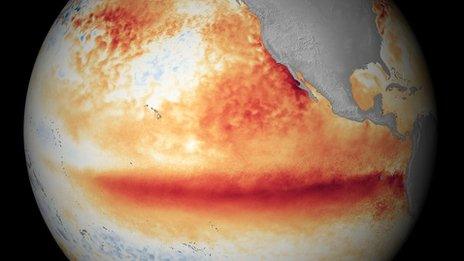Climate change worsened Asia's April heatwave by 2C - study
- Published

Temperatures in Bangladesh hit record highs in April
Climate change raised temperatures by at least 2C in many parts of Asia last month as it suffered a crippling heatwave, a new study says.
The research also found that climate change had made the heatwave 30 times likelier.
India, Bangladesh, Thailand, and Laos all saw record temperatures of up to 45C in April.
The soaring temperatures caused deaths in some countries, melted roads, and left many people in hospital.
Other countries in Asia that are currently tracking unusually high temperatures include China, Indonesia, Singapore, and the Philippines.
Thailand's record heat was exacerbated by high humidity, as well as a large number of forest fires occurring at the same time, said the study by World Weather Attribution, an independent research institute.
Temperatures in the Philippines also hit 37C five days later, leading to heat stroke cases in around 150 schoolchildren.
Thirteen people died from heat stroke in Navi Mumbai, India, after attending an awards ceremony.
Climate historian Maximiliano Herrara, who tracks extreme weather patterns on his Twitter account, called it "the worse heatwave in Asian history".
Heatwaves are one of the deadliest natural hazards in the world, causing thousands of related deaths each year.
However, the full impact of a heatwave is usually not known until weeks or months later, when the deaths are recorded and analysed by scientists, according to the study.
Copenhagen-based Emmanuel Raju, one of the study's authors, said the effects of the heatwave will disproportionately affect the poorest people in the region, as well as people who work outdoors like farmers, street vendors, and construction workers.
The group uses weather data and computer model simulations to determine if and how much climate change is responsible for extreme weather events. Their studies are not peer-reviewed, but are often later published in recognised journals.
"Global temperatures will continue to increase and events like this will become more frequent and severe until overall greenhouse gases emissions are halted," the scientists said in a statement.
A separate study this week found that a key temperature limit is likely to be broken for the first time over the next few years.
Scientists say there's now a 66% chance we will pass the 1.5C global warming threshold between now and 2027.
Related topics
- Published17 May 2023

